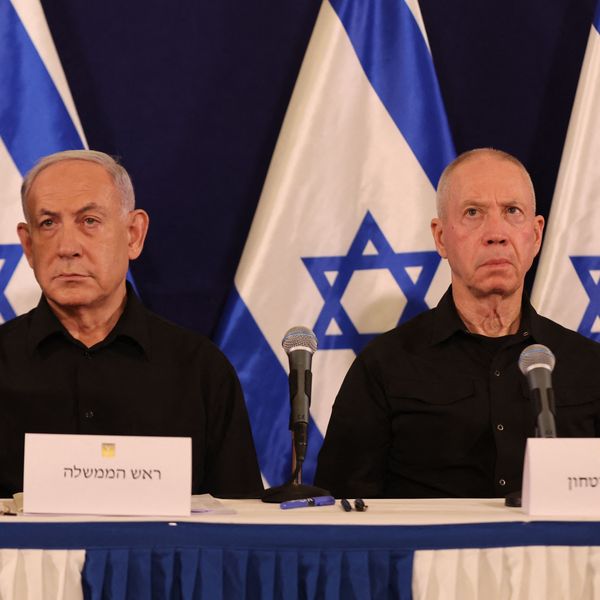International Criminal Court Investigates Human Rights Abuses by British Forces in Iraq
The long-anticipated Chilcot inquiry into the Iraq War released Wednesday contains stinging indictments of Britain's role in the U.S.-led invasion, detailing failures starting with the exaggerated threat posed by Saddam Hussein through the disastrous lack of post-invasion planning. An element conspicuously missing from the report, however, are allegations of systemic abuse by British soldiers--accusations that are currently being considered by a domestic investigative body as well as the International Criminal Court.
The long-anticipated Chilcot inquiry into the Iraq War released Wednesday contains stinging indictments of Britain's role in the U.S.-led invasion, detailing failures starting with the exaggerated threat posed by Saddam Hussein through the disastrous lack of post-invasion planning. An element conspicuously missing from the report, however, are allegations of systemic abuse by British soldiers--accusations that are currently being considered by a domestic investigative body as well as the International Criminal Court.
The claims center on alleged violations committed against Iraqis held in detention by British soldiers between 2003 and 2008. Based on the receipt of a dossier outlining numerous incidents, ICC prosecutor Fatou Bensouda in 2014 reopened a preliminary examination into abuse allegations. The same examination, a step below an official investigation that could yield court cases at The Hague, had initially been closed in 2006 for lack of evidence.
Presented to the court by the British firm Public Interest Lawyers and the Berlin-based European Center for Constitutional and Human Rights, the January communication was followed up by a second batch of cases in September 2015, submitted by Public Interest Lawyers. By November of last year, the ICC reported that it had received 1,268 allegations of ill treatment and unlawful killings committed by British forces. Of 259 alleged killings, 47 were said to have occurred when Iraqis were in U.K. custody.
Both Public Interest Lawyers and a separate firm, Leigh Day, which has helped plaintiffs bring hundreds of parallel civil cases, have a long and tangled history with the British government. They face ongoing criticism for employing agents in Iraq to gather clients in the country and have them sign witness statements, and have been confronted with possible penalties for alleged improprieties during previous British inquiries.
According to a December Freedom of Information release, the government has already settled 323 cases, totaling some 19.6 million pounds. Citing confidentiality clauses, the British government did not in that response offer breakdowns by type of complaint--for instance, the number of settlements for deaths or serious injury.
"The MOD [Ministry of Defense] doesn't settle unless there's good cause--that's the fairest assumption," said Andrew Williams, professor of law at the University of Warwick. "One would think that with almost 20 million pounds and 300 cases you are settling some significant allegations."
Read the full article at The Intercept.
An Urgent Message From Our Co-Founder
Dear Common Dreams reader, The U.S. is on a fast track to authoritarianism like nothing I've ever seen. Meanwhile, corporate news outlets are utterly capitulating to Trump, twisting their coverage to avoid drawing his ire while lining up to stuff cash in his pockets. That's why I believe that Common Dreams is doing the best and most consequential reporting that we've ever done. Our small but mighty team is a progressive reporting powerhouse, covering the news every day that the corporate media never will. Our mission has always been simple: To inform. To inspire. And to ignite change for the common good. Now here's the key piece that I want all our readers to understand: None of this would be possible without your financial support. That's not just some fundraising cliche. It's the absolute and literal truth. We don't accept corporate advertising and never will. We don't have a paywall because we don't think people should be blocked from critical news based on their ability to pay. Everything we do is funded by the donations of readers like you. Will you donate now to help power the nonprofit, independent reporting of Common Dreams? Thank you for being a vital member of our community. Together, we can keep independent journalism alive when it’s needed most. - Craig Brown, Co-founder |
The long-anticipated Chilcot inquiry into the Iraq War released Wednesday contains stinging indictments of Britain's role in the U.S.-led invasion, detailing failures starting with the exaggerated threat posed by Saddam Hussein through the disastrous lack of post-invasion planning. An element conspicuously missing from the report, however, are allegations of systemic abuse by British soldiers--accusations that are currently being considered by a domestic investigative body as well as the International Criminal Court.
The claims center on alleged violations committed against Iraqis held in detention by British soldiers between 2003 and 2008. Based on the receipt of a dossier outlining numerous incidents, ICC prosecutor Fatou Bensouda in 2014 reopened a preliminary examination into abuse allegations. The same examination, a step below an official investigation that could yield court cases at The Hague, had initially been closed in 2006 for lack of evidence.
Presented to the court by the British firm Public Interest Lawyers and the Berlin-based European Center for Constitutional and Human Rights, the January communication was followed up by a second batch of cases in September 2015, submitted by Public Interest Lawyers. By November of last year, the ICC reported that it had received 1,268 allegations of ill treatment and unlawful killings committed by British forces. Of 259 alleged killings, 47 were said to have occurred when Iraqis were in U.K. custody.
Both Public Interest Lawyers and a separate firm, Leigh Day, which has helped plaintiffs bring hundreds of parallel civil cases, have a long and tangled history with the British government. They face ongoing criticism for employing agents in Iraq to gather clients in the country and have them sign witness statements, and have been confronted with possible penalties for alleged improprieties during previous British inquiries.
According to a December Freedom of Information release, the government has already settled 323 cases, totaling some 19.6 million pounds. Citing confidentiality clauses, the British government did not in that response offer breakdowns by type of complaint--for instance, the number of settlements for deaths or serious injury.
"The MOD [Ministry of Defense] doesn't settle unless there's good cause--that's the fairest assumption," said Andrew Williams, professor of law at the University of Warwick. "One would think that with almost 20 million pounds and 300 cases you are settling some significant allegations."
Read the full article at The Intercept.
The long-anticipated Chilcot inquiry into the Iraq War released Wednesday contains stinging indictments of Britain's role in the U.S.-led invasion, detailing failures starting with the exaggerated threat posed by Saddam Hussein through the disastrous lack of post-invasion planning. An element conspicuously missing from the report, however, are allegations of systemic abuse by British soldiers--accusations that are currently being considered by a domestic investigative body as well as the International Criminal Court.
The claims center on alleged violations committed against Iraqis held in detention by British soldiers between 2003 and 2008. Based on the receipt of a dossier outlining numerous incidents, ICC prosecutor Fatou Bensouda in 2014 reopened a preliminary examination into abuse allegations. The same examination, a step below an official investigation that could yield court cases at The Hague, had initially been closed in 2006 for lack of evidence.
Presented to the court by the British firm Public Interest Lawyers and the Berlin-based European Center for Constitutional and Human Rights, the January communication was followed up by a second batch of cases in September 2015, submitted by Public Interest Lawyers. By November of last year, the ICC reported that it had received 1,268 allegations of ill treatment and unlawful killings committed by British forces. Of 259 alleged killings, 47 were said to have occurred when Iraqis were in U.K. custody.
Both Public Interest Lawyers and a separate firm, Leigh Day, which has helped plaintiffs bring hundreds of parallel civil cases, have a long and tangled history with the British government. They face ongoing criticism for employing agents in Iraq to gather clients in the country and have them sign witness statements, and have been confronted with possible penalties for alleged improprieties during previous British inquiries.
According to a December Freedom of Information release, the government has already settled 323 cases, totaling some 19.6 million pounds. Citing confidentiality clauses, the British government did not in that response offer breakdowns by type of complaint--for instance, the number of settlements for deaths or serious injury.
"The MOD [Ministry of Defense] doesn't settle unless there's good cause--that's the fairest assumption," said Andrew Williams, professor of law at the University of Warwick. "One would think that with almost 20 million pounds and 300 cases you are settling some significant allegations."
Read the full article at The Intercept.

